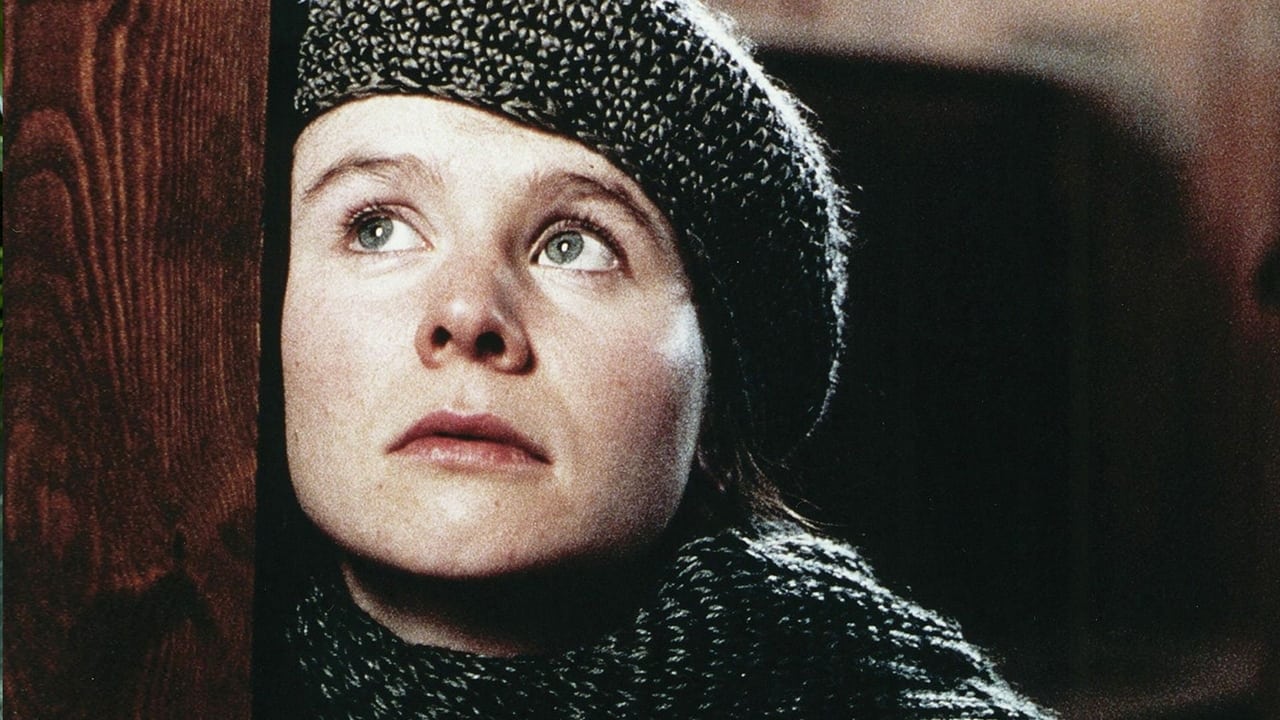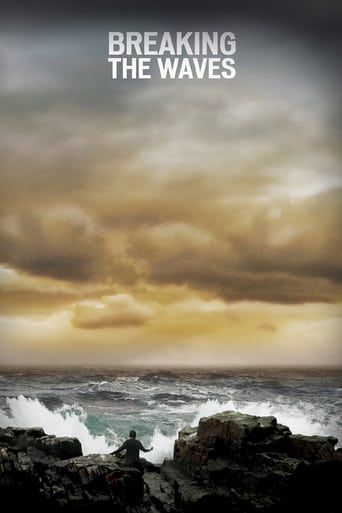

If I had a dollar for every time 'devastating' was used to describe a Lars Von Trier film, I would have...well, a lot of money. He continually relishes on images that shock the mind and soul. He is admired for his ability to not hold back. His ties to Dogme 95 are evident, but paradoxically, here he makes it a deliberate stylistic endeavour; his favoured nervy, hand-held style, the washed out palette, the graininess of the image. How ironic that in the pursuit of authenticity and simplicity he had taken an extra, unnatural step - the filtered look of the film was achieved by transferring the stock to video and back again. The desired impression is the guise of naturalism and realism, as if we were observing the events ourselves. But this collapses on itself when we are the only ones in the scene with Emily Watson. Suddenly the fragility takes on a different meaning. We become perverse intruders on a mental breakdown, but there is no one here save for the audience, so it is performance we are witnessing. To her credit, Watson keeps us guessing whilst the script is more direct. It presents to us a child, without any tangible prospects or abilities, who throws tantrums when control is wrested away from her because of the real world's demands. She counts the days on the calendar until her beloved Jan returns, but this isn't enough - Von Trier feels the need to throw in a crude, stick figure drawing as though she is a kindergartner with a crush. The first time she responds to her own prayer in a deeper intonation (God is Irish, apparently), it is mildly humorous, but by the end it is tragic. Watson is good enough to seed doubt in our minds. When her faith begins to waver, these prayers lose their mystical quality and just once, she responds as God in her normal voice. She shows glimpses of Bess' logic and reason when she wrests with her own conscience and selfishness. In the very early beginnings, she acknowledges the camera and invites us into her mind, cheekily grinning and almost winking at what is to come. There are brief moments of heart and stability; see how Watson makes phone sex endearing and cute, how she pauses and hesitates to be explicit, because her religion has coded her against it. So to dive into the deep end, and go against these teachings must demonstrate incredible strength and willpower, must it not? A oft criticism of the film is that it treats Bess not only in childish terms, but as a surrogate for battering, being shoved along without agency and subject to continually harsher abuse. She is confined by the patriarchal constructs of the religion, raised a virgin and cursed to hell for her sins (but those sins which are an act of bravery and pure love). A gender reversal would not only be illogical and radical, but conjure none of the shock. Von Trier is vague about the origins of her development and capabilities, and hastily sidesteps this dilemma. He answers the true question with his final sequences, which are steeped in Christian allegory: the public denouncing by the church (the Pharisees), the Christlike sacrifice by taking the burden of sin, the desecration of the grave for and the spiritual rebirth (at sea), with the bells signalling the miracles that we have witnessed. It's religious propaganda, and not subtle at that; Bess must be put through figurative hell (the result of her own sin) before she finally gains her martyrdom. And it is typical Von Trier, a cruel joke played by a cruel god. She dies with the knowledge that she has failed her husband, and is going to literal hell. Only then can Jan begin to walk again.
... View MoreLars von Trier's Breaking the Waves tells the story of Bess McNeill (Emily Watson), a young Scottish woman burdened by psychological issues and the judgments of a frigid, Calvinist community that clings to the traditional teachings of the church. By traditional, I mean classic gender roles and little to no expressive freedoms outside the home can be enjoyed and embraced by females. Bess, like most women in the village, marries young, to an oil rig worker named Jan (Stellan Skarsgård), an atheist who provides Bess with the kind of warmth and acceptance she's not used to, not even from her own family. Bess's relationship with Jan is one of the most significant relationships she has in life, tied only with God, who she prays to each day and converses with Him using her own voice. More on that later.When Jan takes a job out of town, Bess becomes incredibly lonely, one day praying for Jan to come home. Following a serious, nearly-fatal accident at an oil site that leaves Jan paralyzed, Bess curses herself for being "selfish" and wishing for Jan to return home. Because of this, she submits herself to the mercy of Jan, who instructs her to go out in the world and seek the highest form of human pleasure, sexual intercourse, for he feels like a failure of a man for never being able to provide her with such sensations and feelings ever again. The film follows Bess's sexual awakening, as she's caught between the cold shoulders of her family and her village along with the desire to please Jan and adhere to the teachings and expectations of her almighty creator.Von Trier illustrates from the beginning that Bess carries the crippling weight of harsh judgment on her shoulders from numerous different individuals, and downplays the idea of mental illness in favor of showing the repercussions of such pressure. If you were living in a traditional village, already a minority being a female, limited in your rights as a human being, felt ostracized and unloved by your family, harshly criticized no matter what choice you made, and the only person you were able to unconditionally love who loved you back sat on the teetering edge of death and lackluster quality of life, I think you'd be hardpressed not to have a mental breakdown. Von Trier illustrates the Bess character as someone not easily written off as a whiny, insecure twit nor somebody crippled by a mental illness, but somebody tired and worn, and who will only grow to be more exhausted as time goes on.Her conversations with God are the most interesting because, as I stated before, she acts as God responding to her prayers and requests. Her comments as God reflect an assumed bitterness about the Almighty's general attitude towards her and her decisions that seems to more or less be made up of the general opinion of her in her village. This explicitly shows that she has predicated her idea about God's opinion of her thanks to the false, perverted teachings of her Calvinist church and the rejection of her family. It's an ugly way to see life, but who could blame her for not bearing even a shred of confidence after all that she has been through in life? Breaking the Waves follows Bess closely for all one-hundred and fifty-nine minutes, rarely including a scene without her and rarely losing sight of her as a character. Metaphorical interpretation of the character could potentially see her as Jesus Christ himself, somebody well-worn with the responsibility of providing solace (or "saving" in a grandiose sense) to the one she loves, and putting up with a great deal of mistreatment amongst her peers, especially as she turns to prostitution. A key parallel between Bess's story and the life of Christ is when Bess is walking her bicycle through her village, in torn leggings, looking disheveled and moments from collapse, as young children walk behind her, throwing rocks at her and hurling insults. This scene directly mimics widespread interpretation of the Romans taunting Christ as he carried his cross to his death, and in this particular scene, Bess is made so powerless and feeble that the children that tail her are seen as more powerful and worthy than her.The film is shot in the 1990's style known as "Dogma 95" which was characterized by immediacy, naturalism, and the lack of artistic credit. The film is shot with a hand-held camera, using natural, available light and nothing more, and neither von Trier nor any of the actors involve receive credit in the form of opening or closing titles within the film. This provides Breaking the Waves with an additional later of blunt realism, capturing the ugliness of life as is and not tweaking or modifying its appearance to fit some kind of cutesy disposition or inauthentic portrayal of mood. Dogma 95 is a style that effectively communicates ugliness and it does nothing but elevate this film to a grittier height.Whether you're viewing it as a surface exploration of a battered character driving herself off a cliff she's long rested on the edge of or a story that mirrors the life of our lord and savior, Breaking the Waves is a fantastic motion picture, heartbreaking and, not only brutal, but convincing in its depiction of depravity. Von Trier masterfully contrasts the beauty and intimacy sex can bring and the horrid, unexpected consequences it can bring when practiced in a shallow and unsafe manner, along with putting emotionally complex characters on screen for us to evaluate in several different ways. The 1990's was a decade that allowed for revolutionary cinematic movements far and wide, and amidst incredibly pivotal voices of Richard Linklater and Spike Lee, was Lars von Trier, who showed it like it was in a way nobody wanted to see, but needed to.
... View MoreTo however it may concern. CAREFUL It is supposed to be a 7,9/10 movie about human beliefs,faith and life and strong emotions like love. After having the Misfortune to see it this is a review. The film has a unique picture that seems like a cheap hand-held camera.Somewhat irritating but again i thought that they want to emphasize the story and characters so i didn't mind. It also has an interesting start of a story that seems promising and deep.BUT the story continues without adding anything to the mystery and drama situation it shows and it is moving with a very slow pacing and i mean VERY SLOW, (it is 2:30+ hours film.) In so much time it should really built up interesting characters but no. As the movie continues you will feel that you cant really relate to ANYONE, the story is Bizarre and with absolutely no meaning. Acting is quite bad way worse than most TV shows. I really don't see how it is SO OVERRATED, I ONLY ASSUME CRITICS SLEPT AFTER A WHILE SO THEY RATED THEIR DREAM! Serioysly it is a 3 /10 MAX and that is being generous. BUT UNFORTUNATELY it has a MISLEADING Rating that made ME( and many others lol) to LOSE 2+ hours of my life to it. I feel cheated of imd rating.
... View MoreThis is hands down, one of the best movies of all time. I watched it again for the third time and loved it even more than the first time I saw it. It is a beautiful, both complex and simple, powerful, compelling and heart-breaking love story that is also deeply spiritual. Though very sad, it is also uplifting in the end. It will make you laugh, cry and think about what is truly important in life. This is filmmaking at its finest--one of Lars Von Tiers best works. Emily Watson is mesmerizing. She was nominated for an Oscar for this role and should have won. This is one of the best performances by an actress ever. Stellan Skarsgard is also wonderful. This film is like eating a fine delicacy. I could watch it again and again. It really holds up to the test of time. I am sure in another 20 years people will still be talking about this film.
... View More